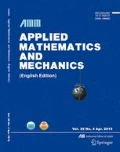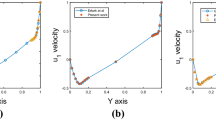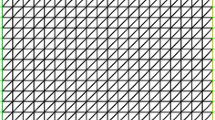Abstract
A new full discrete stabilized viscosity method for the transient Navier-Stokes equations with the high Reynolds number (small viscosity coefficient) is proposed based on the pressure projection and the extrapolated trapezoidal rule. The transient Navier-Stokes equations are fully discretized by the continuous equal-order finite elements in space and the reduced Crank-Nicolson scheme in time. The new stabilized method is stable and has many attractive properties. First, the system is stable for the equal-order combination of discrete continuous velocity and pressure spaces because of adding a pressure projection term. Second, the artifical viscosity parameter is added to the viscosity coefficient as a stability factor, so the system is antidiffusive. Finally, the method requires only the solution to a linear system at every time step. Stability and convergence of the method is proved. The error estimation results show that the method has a second-order accuracy, and the constant in the estimation is independent of the viscosity coefficient. The numerical results are given, which demonstrate the advantages of the method presented.
Similar content being viewed by others
References
Brezzi, F. and Fortin, M. Mixed and hybrid finite element methods. Springer Series in Computational Mathematics, Vol. 15, Springer, New York (1991)
Girault, V. and Raviart, P. Finite Element Methods for the Navier-Stokes Equations, Springer, Berlin (1986)
Zhou, T. X. and Feng, M. F. A least square Petrov-Galerkin finite element method for the stationary Navier-Stokes equations. Mathematics of Computation 66(202), 531–543 (1993)
Douglas, J. and Wang, J. An absolutely stabilized finite element method for the Stokes problem. Mathematics of Computation 52(186), 495–508 (1989)
Bochev, P. B., Dohrman, C. R., and Gunzburger, M. D. Stabilization of low-order mixed finite elements for the Stokes equations. SIAM Journal on Numerical Analysis 44(1), 82–101 (2006)
Li, J. and He, Y. N. A stabilized finite element method based on two local Guass integrations for the Stokes equations. Journal of Computational and Applied Mathematics 214(1), 58–65 (2008)
Dohrman, C. R. and Bochev, P. B. A stabilized finite element method for the Stokes problem based on polynomial pressure projections. International Journal for Numerial Methods in Fluids 46(2), 183–201 (2004)
He, Y. N. and Li, J. A stabilized finite element method based on local polynomial pressure projection for the stationary Navier-Stokes equations. Applied Numerical Mathematics 58(10), 1503–1514 (2008)
Li, J., He, Y. N., and Chen, Z. X. A new stabilized finite element method for the transient Navier-Stokes equations. Computer Methods in Applied Mechanics and Engineering 197(1–4), 22–35 (2007)
Heywood, J. G. and Rannacher, R. Finite-element approximation of the nonstationary Navier-Stokes problem, part IV: error estimates for second-order error estimates for spatial discretization. SIAM Journal on Numerical Analysis 27(2), 353–384 (1990)
Girault, V. and Raviart, P. A. Finite element approximation of the Navier-Stokes equations. Lecture Notes in Mathematics, Vol. 749, Springer-Verlag, Berlin/New York (1974)
He, Y. N. Two-level method based on finite element and Crank-Nicolson extrapolation for the time-dependent Navier-Stokes equations. SIAM Journal on Numerical Analysis 41(4), 1263–1285 (2003)
Burman, E. Pressure projection stabilizations for Galerkin approximations of Stokes’ and Darcy’ problem. Numerical Methods for Partial Differential Equations 24(1), 127–143 (2008)
Heywood, J. G. and Rannacher, R. Finite element approximation of the nonstationary Navier-Stokes problem I: Regularity of solutions and second-order error estimates for spatial discretization. SIAM Journal on Numerical Analysis 19(2), 275–311 (1982)
Author information
Authors and Affiliations
Corresponding author
Additional information
Communicated by Zhe-wei ZHOU
Project supported by the Sichuan Science and Technology Project (No. 05GG006-006-2) and the Research Fund for Introducing Intelligence of Electronic Science and Technology of China
Rights and permissions
About this article
Cite this article
Qin, Ym., Feng, Mf. & Zhou, Tx. A new full discrete stabilized viscosity method for transient Navier-Stokes equations. Appl. Math. Mech.-Engl. Ed. 30, 839–852 (2009). https://doi.org/10.1007/s10483-009-0704-z
Received:
Revised:
Published:
Issue Date:
DOI: https://doi.org/10.1007/s10483-009-0704-z




